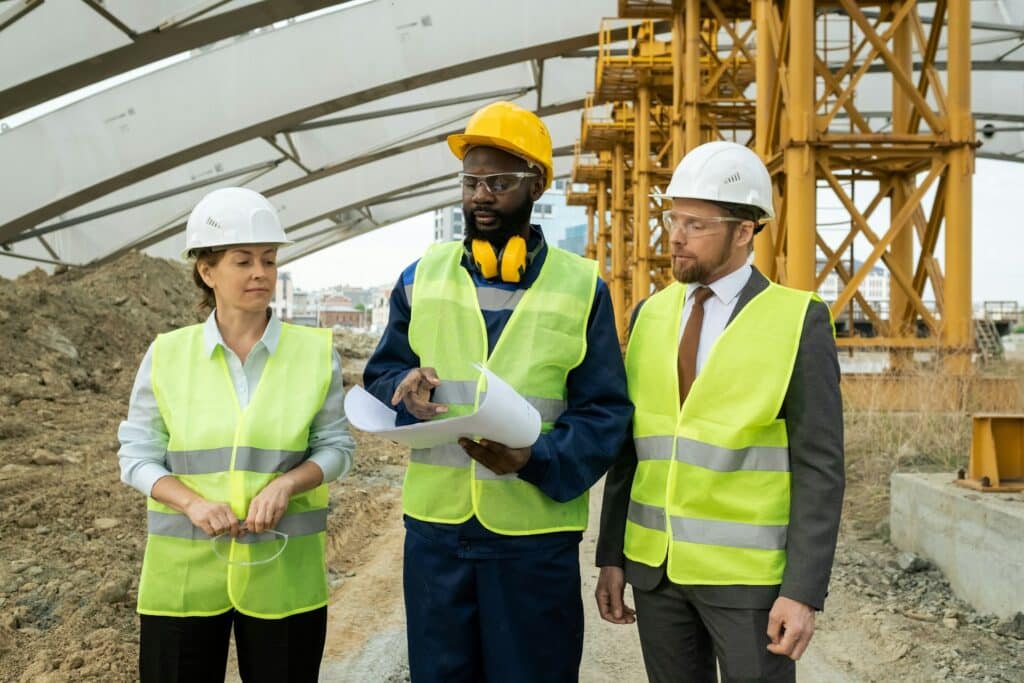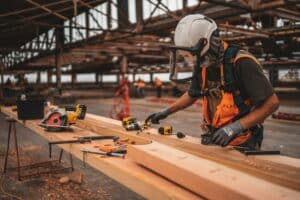Planning to build in Thailand? Before you start, it’s vital to get the right permits. Permits are crucial to ensure your project complies with Thai laws and regulations. Skipping this step can lead to fines, delays, or even having to tear down your work. Getting the right permits up front saves a lot of trouble down the road.
Building Permit Application Process
Applying for a building permit in Thailand is essential for starting any construction project. Here’s how you can do it:
Steps to Apply for a Building Permit:
1. Prepare Your Plan: Start with detailed architectural and structural plans of your project. These plans must follow Thai building codes and regulations.
2. Submit Your Application: Go to the local District Office or Municipal Office to submit your building permit application. Include all necessary forms and application fees.
3. Get Approvals: Your plans will be reviewed by various departments. This includes zoning, fire safety, and utilities. Each department must approve your plans before you get the building permit.
4. Receive Your Permit: Once all departments have approved, you’ll be issued a building permit. This legal document allows you to start construction.
Required Documents and Approvals:
– Architectural Plans: Must show detailed designs and floor plans.
– Structural Plans: Include details of the foundation, framing, and any load-bearing elements.
– Land Ownership Proof: Provide documents proving ownership or long-term lease of the land.
– Environmental Impact Report: Depending on your project, you may need an EIA.
– Utility Approval: Approval from local utility companies for water, electricity, and sewage connections.
Common Challenges and Solutions:
– Incomplete Applications: Ensure all forms and documents are complete. Missing information can delay approval.
– Misalignment with Codes: Make sure your plans follow Thai building codes. Consulting with a local expert can help.
– Approval Delays: Stay in close contact with the District Office to monitor progress and address issues promptly.
Environmental Impact Assessment (EIA) Permits
Some projects in Thailand need an Environmental Impact Assessment (EIA) permit. This permit evaluates how your construction affects the environment.
Projects That Require EIA:
– Large-Scale Developments: Includes hotels, resorts, and large residential complexes.
– Industrial Projects: Factories and plants.
– Infrastructure Projects: Roads, bridges, and airports.
– Coastal and Marine Projects: Any construction near water bodies.
Steps to Obtain an EIA Permit:
1. Conduct an EIA Study: Hire an approved agency to conduct the Environmental Impact Assessment. They’ll study the potential effects of your project on the land, water, air, and local communities.
2. Submit the EIA Report: Include the report with your building permit application. The EIA report must address all potential environmental impacts and propose mitigation measures.
3. Review and Approval: The report is reviewed by the Office of Natural Resources and Environmental Policy and Planning (ONEP). They will either approve it or ask for further information.
4. Get the Permit: Once approved, you’ll receive an EIA permit, allowing you to proceed with your project.
Importance of Complying with EIA Regulations:
Complying with EIA regulations is vital. It helps protect the environment and ensures sustainable building practices. Ignoring EIA requirements can lead to hefty fines, project delays, or even the cancellation of your project. By following these steps and securing an EIA permit, you help ensure that your construction project is responsible and legally compliant.
These two sections give you a clear understanding of the key permits needed before you start building in Thailand. Up next, we’ll cover zoning and utility permits to complete your permit checklist.
Zoning and Land Use Permits
Understanding zoning and land use permits is key to your building project in Thailand. Zoning laws define what kind of buildings can be constructed in specific areas. Here’s how to navigate these rules:
Understanding Zoning Laws:
– Residential Zoning: Areas designated for homes and residential buildings.
– Commercial Zoning: Allows for businesses, shops, and offices.
– Industrial Zoning: Meant for factories, warehouses, and heavy industrial activities.
– Agricultural Zoning: Land reserved for farming and agriculture.
Knowing the zoning type for your land is crucial. Building a commercial property in a residential zone can lead to legal complications, fines, or forced modifications.
How to Apply for Zoning Permits:
1. Check Zoning Maps: Start by checking your local zoning maps available at the District Office or Municipality. These maps show the zoning status of different plots.
2. Submit an Application: Fill out a zoning permit application. Provide details about your project, including building plans and the intended use of the land.
3. Approval Process: Submit your application to the local zoning board for review. They will ensure your project aligns with local zoning laws. Approval times can vary, so be prepared for a wait.
Ensuring Your Project Meets Land Use Regulations:
Meeting land use regulations ensures your project doesn’t face legal issues. It’s best to work with a local expert who understands Thai zoning laws. This helps avoid any surprises and keeps your project on track. Also, be prepared to make adjustments to your plans if needed to comply with local regulations.
Utility and Infrastructure Permits
Utility and infrastructure permits are vital for any construction project. They ensure your building has access to basic services like electricity, water, and sewage.
Permits for Electrical and Water Connections:
– Electrical Connection: You need a permit from the Provincial Electricity Authority (PEA) to connect your building to the electrical grid.
– Water Connection: Apply to the local water authority for a permit to connect to the municipal water supply.
– Sewage and Drainage: Ensure proper sewage connections by obtaining permits from local municipal offices.
Steps to Get Utility Permits:
1. Prepare Your Plans: Make sure your construction plans include details about electrical, water, and sewage systems.
2. Submit Applications: Submit separate applications for each utility service. You’ll need to provide technical diagrams and pay any application fees.
3. Inspection and Approval: Utility companies will inspect your site to ensure it can safely connect to their services. Once approved, you’ll receive the necessary permits.
Importance of Infrastructure Permits for Your Project:
Utility and infrastructure permits are critical for making your building functional. Without these permits, you won’t have essential services, making it hard to complete or use your building. It’s important to get these permits early to avoid delays. Properly approved connections ensure safety and compliance with local regulations, making your project smoother and hassle-free.
Conclusion
Securing the right permits is a crucial step in any building project in Thailand. From building and EIA permits to zoning and utility approvals, each permit ensures your project meets Thai laws and standards. Without these permits, you risk fines, delays, and legal issues that can halt your construction.
Understanding the permit processes helps you plan better and avoid potential pitfalls. Each type of permit requires different steps and documents, making it essential to know what’s needed ahead of time. Working with local experts can greatly ease the process, ensuring all requirements are met efficiently.
At CJ Samui Builders, we specialize in handling Thailand construction projects, making your building journey smoother. Ready to start your construction project? Contact CJ Samui Builders today to make sure you’ve got all the necessary permits and approvals!




